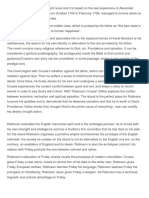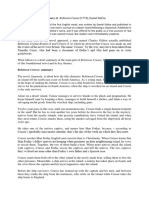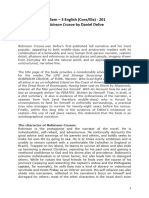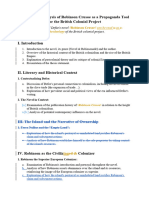Robinson Crusoe
Robinson Crusoe
Uploaded by
emanuelanovelli6Copyright:
Available Formats
Robinson Crusoe
Robinson Crusoe
Uploaded by
emanuelanovelli6Copyright
Available Formats
Share this document
Did you find this document useful?
Is this content inappropriate?
Copyright:
Available Formats
Robinson Crusoe
Robinson Crusoe
Uploaded by
emanuelanovelli6Copyright:
Available Formats
ROBINSON CRUSOE
In writing a novel about a shipwreck on a desert Island, Defoe was using a popular theme. It is
considered the first modern novel. It is a fictitious narrative which the author tries to pass off as
true. It is a sort of “fake autobiography”. Here the realistic elements are of the greatest
importance. To inhance its realism Defoe supplies many facts about Robinson Crusoe, he gives us
in short a life-profile.
The story is told by a first person narrator, Robinson Crusoe himself.
Robinson Crusoe is, in many ways, the celebration of the English mercantile spirit, the
representative of the English man, who was colonizing the world, the archetypal pioneer.
He is armed only with his own strength and intelligence. The Island is the ideal place for Robinson
to prove his qualities. He can shape his destiny through action and has a firm Puritan convinction
that he has God on his side. It is not a return to nature but a chance to exploit and dominate
nature. On the Island Robinson organizes a primitive empire, thus becoming the prototype of the
English colonist.
This becomes clear especially in the last part of the novel, after he has met Friday. Their
relationship perfectly reflects that between colonist and native.
Robinson’s education of Friday mirrors the processes of modern colonialism: which follow a
recurrent pattern:
name giving: Robinson gives Friday a name to remind the native of his debt to the white man (he
was rescued by Robinson on a Friday)
new European clothes: Robinson covers Friday’s nakedness by living him worn-out European
clothes;
new language: Robinson does not bother to learn Friday’s language but teaches him enough
English to be able to understand his master and follow his orders;
new religion: Robinson teaches Friday the principles of Christianity;
technical superiority: Robinson has weapons and more sophisticated utensils.
He has been rightly defined as homo oeconomicus, representative of the early 18th century
Britons who were establishing a commercial empire.
The novel can also be read as a spiritual autobiography because it is full of religious references to
God, sin and salvation.The hero reads the Bible to find comfort and guidance.
You might also like
- Summary of Robinson CrusoeDocument4 pagesSummary of Robinson Crusoeellen2067% (3)
- Colonialism in Robinson Crusoe by DefoeDocument2 pagesColonialism in Robinson Crusoe by DefoeDaffodil100% (3)
- Robinson CrusoeDocument1 pageRobinson CrusoeDadi DadiNo ratings yet
- Niloy Mukherjee CC8Document5 pagesNiloy Mukherjee CC8xihsoumi.chatterjiNo ratings yet
- Colonialism in Robinson CrusoeDocument3 pagesColonialism in Robinson CrusoeshanezaNo ratings yet
- Commentary Robinson Crusoe - OdtDocument4 pagesCommentary Robinson Crusoe - OdtAdriana AadrianaaNo ratings yet
- Robinson As A Colonial TextDocument2 pagesRobinson As A Colonial Textpalsneha328No ratings yet
- DefoeDocument11 pagesDefoeTrick shotNo ratings yet
- HEL - I - 2 - Defoe - Robinson CrusoeDocument25 pagesHEL - I - 2 - Defoe - Robinson CrusoeSteven MartinNo ratings yet
- Robinson CrusoeDocument3 pagesRobinson CrusoeTarun Sethi100% (2)
- Daniel DefoeDocument5 pagesDaniel Defoelindapapaleo04No ratings yet
- Pacuretu Maria Simina Andrei Ana MariaDocument20 pagesPacuretu Maria Simina Andrei Ana MariaSamanthaFox28100% (1)
- Daniel DefoeDocument8 pagesDaniel DefoetsvetkovanellyNo ratings yet
- Summary of Robinson CrusoeDocument4 pagesSummary of Robinson Crusoeouedraogojason00No ratings yet
- Daniel DefoeDocument1 pageDaniel DefoeMichele TrottaNo ratings yet
- Daniel DefoeDocument1 pageDaniel DefoeRaj DasNo ratings yet
- The Slavery Relationship Between Friday and Robinson Crusoe After Robinson Crusoe by D. Defoe: An EssayDocument5 pagesThe Slavery Relationship Between Friday and Robinson Crusoe After Robinson Crusoe by D. Defoe: An EssayHena KhanNo ratings yet
- Robinson CrusoeDocument2 pagesRobinson CrusoeMk.loveNo ratings yet
- 6 Robinson Crusoe Themes BookDocument39 pages6 Robinson Crusoe Themes BookNguyen The Huy100% (1)
- Robinson Crusoe's AnalysisDocument4 pagesRobinson Crusoe's Analysisqinaz IrNo ratings yet
- Defoe e SwiftDocument40 pagesDefoe e Swiftanna.esposito67890No ratings yet
- Robinson Crusoe's Novel .Summarised by Mohammad AwanahDocument10 pagesRobinson Crusoe's Novel .Summarised by Mohammad Awanahعبدالرحمن المسلميNo ratings yet
- 4_6003846817853216215Document19 pages4_6003846817853216215yidaheb532No ratings yet
- Adventure: Life As A Perilous Journey Importance of ReligionDocument2 pagesAdventure: Life As A Perilous Journey Importance of ReligionvikaNo ratings yet
- The Life and Adventures of Robinson Crusoe by Daniel Defoe (Book Analysis): Detailed Summary, Analysis and Reading GuideFrom EverandThe Life and Adventures of Robinson Crusoe by Daniel Defoe (Book Analysis): Detailed Summary, Analysis and Reading GuideNo ratings yet
- Robinson Crusoe CorrettoDocument4 pagesRobinson Crusoe Correttoteresa papanoNo ratings yet
- Sem.5, AdventureDocument7 pagesSem.5, AdventureMasha Yashchuk100% (1)
- Rose Marydas. BDocument8 pagesRose Marydas. BSaher SebayNo ratings yet
- PJDocument6 pagesPJManash Jyoti DasNo ratings yet
- Robinson Crusoe Group 12Document18 pagesRobinson Crusoe Group 12Đào Khánh NguyênNo ratings yet
- From The Restoration To The Augustan AgeDocument17 pagesFrom The Restoration To The Augustan AgeNicolò PiccioniNo ratings yet
- Review of "Robinson Crusoe"Document26 pagesReview of "Robinson Crusoe"Rares PopescuNo ratings yet
- Group 1 - Robinson CrusoeDocument8 pagesGroup 1 - Robinson CrusoePhương NguyễnNo ratings yet
- Postcolonial Analysis On Novel Robinson CrusoeDocument4 pagesPostcolonial Analysis On Novel Robinson CrusoeIan Chen0% (1)
- Robinson Crusoe by Daniel DefoeDocument3 pagesRobinson Crusoe by Daniel Defoesalim.raad2004No ratings yet
- Русский EnglishDocument35 pagesРусский EnglishЛина НикNo ratings yet
- Robinson Crusoe by Daniel DefoeDocument2 pagesRobinson Crusoe by Daniel DefoeOdette OddaNo ratings yet
- Robinson Cruseo - Danial Defore - NotesDocument5 pagesRobinson Cruseo - Danial Defore - Notesjenishsheladiya756No ratings yet
- Robinson Crusoe Study GuideDocument9 pagesRobinson Crusoe Study GuideTasnim Azam Moumi100% (2)
- English NotesDocument7 pagesEnglish Notesfrancesca toniazzoNo ratings yet
- Roinson CrusoeDocument11 pagesRoinson CrusoeEvans Sam VictorNo ratings yet
- 227-237 DefoeDocument11 pages227-237 Defoe5jhzq6ywgwNo ratings yet
- Seminar 6 Daniel Defoe Robinson Crusoe Assignments: Flanders and A Journal of The Plague Year, Both Published in 1722Document4 pagesSeminar 6 Daniel Defoe Robinson Crusoe Assignments: Flanders and A Journal of The Plague Year, Both Published in 1722vikaNo ratings yet
- Refer at AsDocument8 pagesRefer at AsazoresfranceNo ratings yet
- Colonialism in R.CDocument4 pagesColonialism in R.Cgermano.moroccoNo ratings yet
- A Fictional Biography: Economic ManDocument1 pageA Fictional Biography: Economic ManginNo ratings yet
- Defoe (2305843009213723430) PDFDocument1 pageDefoe (2305843009213723430) PDFginNo ratings yet
- Thesis On Robinson CrusoeDocument4 pagesThesis On Robinson Crusoeafjrqokne100% (2)
- Daniel Defoe - Robinson CrusoeDocument6 pagesDaniel Defoe - Robinson Crusoeat0555177No ratings yet
- Robinson Crusoe - Group 16Document8 pagesRobinson Crusoe - Group 16Ánh XưnNo ratings yet
- 6.the EnlightenmentDocument16 pages6.the EnlightenmentMariana VasilievNo ratings yet
- CrusoeDocument2 pagesCrusoemele_t0% (1)
- Colonialism in The Eye of Robinson CrusoeDocument4 pagesColonialism in The Eye of Robinson CrusoezhewarNo ratings yet
- Robinson CrusoeDocument4 pagesRobinson CrusoeFilter BlackNo ratings yet
- Robinson CrusoeDocument16 pagesRobinson CrusoeSergei IvanovNo ratings yet
- Document (1) - 1Document7 pagesDocument (1) - 1Chaursiya RupanjaliNo ratings yet
- Defoe StyleDocument19 pagesDefoe StyleannaNo ratings yet
- M Chaddi TFM Outline RevjsrDocument3 pagesM Chaddi TFM Outline Revjsrgermano.moroccoNo ratings yet
- 17 Century British Literature Restoration and EnlightenmentDocument38 pages17 Century British Literature Restoration and EnlightenmentBiaNo ratings yet
- Daniel Defoe Jonathan SwiftDocument7 pagesDaniel Defoe Jonathan Swiftmihai cristinaNo ratings yet



























































